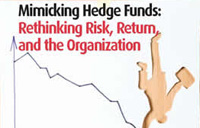 What are the anthropological roots of the financial meltdown of 2008?
What are the anthropological roots of the financial meltdown of 2008?
Today, anthropologists at York University will consider that question as part of the annual lecture presented by the Department of Anthropology in the Faculty of Liberal Arts & Professional Studies.
The lecture features Karen Ho, an associate professor of anthropology at the University of Minnesota, Twin Cities, and one of a new breed of anthropologists examining the financial markets. Today, from 3:30 to 5:30pm, Ho will present her research on the anthropology of economy and how it relates to the 2008 global financial crisis.
Her research centres on the problematic of understanding and representing financial markets, sites that are resistant to cultural analysis and disavow various attempts to locate or particularize them. Ho’s domain of interest is the anthropology of economy, broadly conceived. She considers finance capital, capitalism, globalization, corporations, inequality, dominant discourses, comparative studies of race and ethnicity and feminist epistemologies.
“Ho draws on her deep personal experience and work in Wall Street and will speak about why and how the 2008 financial crisis occurred,” says Professor Albert Schrauwers, Department of Anthropology chair and undergraduate program director. “This will be a compelling lecture and all are welcome to attend.”
Ho’s ethnography, Liquidated: An Ethnography of Wall Street (Duke University Press, 2009), based on three years of fieldwork among investment bankers and major financial institutions, has won two honorable mentions from the Society for Cultural Anthropology and the Society for the Anthropology of North America.
Recent publications include: “Disciplining Investment Bankers, Disciplining the Economy” (American Anthropology, 2009); “Finance” (Encyclopedia of Social & Cultural Anthropology, 2010); “Outsmarting Risk: From Bonuses to Bailouts” (Anthropology Now, 2010); and “Financial Morality” (Didier Fassin’s Companion to Moral Anthropology, Blackwell 2012).
Her latest book project attempts to excavate an alternative cultural history of financial risk through the ethno-historic investigation of three central sites – corporations, investment practices and investment funds – from the mid-twentieth century until the present moment.
The lecture, which is free and open to the public, will take place in 010 Technology Enhanced Learning Building (TEL) on York’s Keele campus.


